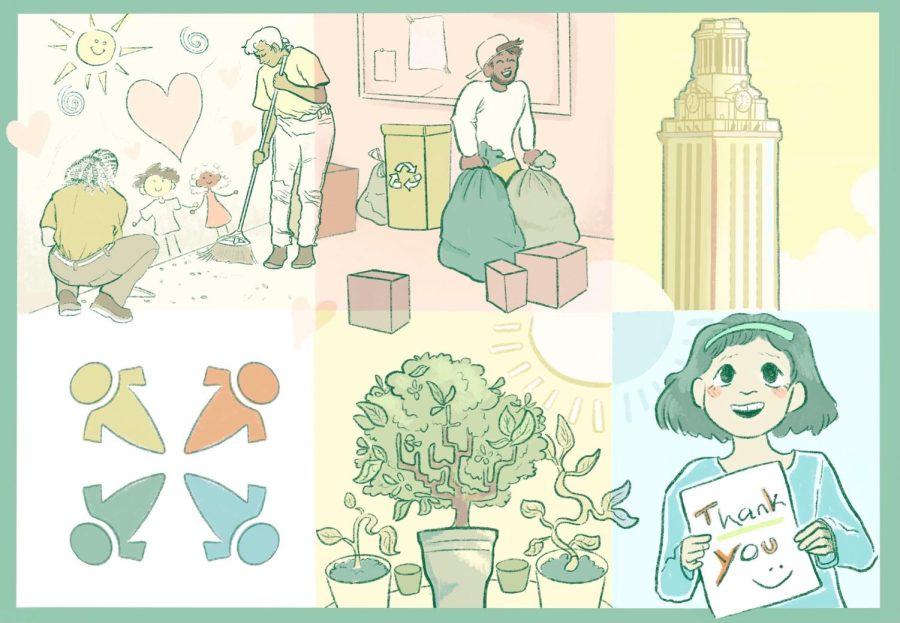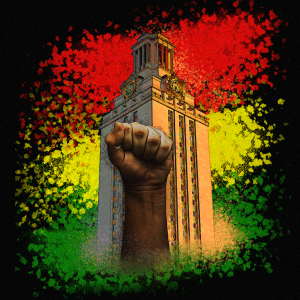Here’s why volunteerism is important
January 24, 2023
As English freshman Trinity Ngo packs care packages and food boxes for the Latinx-American community, she reflects on what volunteerism means. To her, it’s a merger of noble service and fostering keen memories with those close to her. Ngo finds appreciation in activities where she can help others.
It’s true. Rain or shine, UT students volunteer.
Whether it’s getting their hands dirty by servicing UT’s microfarm or writing meaningful notes to the community, it’s clear that the University values volunteerism. In fact, the University boasts an estimated $5.9 million total economic impact, with more than 200,000 hours of service.
Community service and engagement drive society. Service has the ability to steer the conversations of power, of who and what is prioritized. Yet, volunteerism has a special undertone – one of appreciation and dignity.
Volunteerism is core to serving others, but also to serving yourself mentally, emotionally and even physically. As such, students should get involved in volunteerism — an important and pivotal aspect of UT’s community.
Many students and faculty will have their own reasons and interests when volunteering. Universally, it’s an excellent way to integrate within the Austin community.
“As a college student who isn’t from Austin, volunteering is a good way to learn more about the demographic around here. Trying to get involved with the local population, and help in a way where you’re communicating with the community,” Ngo said.
Students and faculty alike are preoccupied with personal goals, academia and other extracurriculars. For many students, it can feel like less of a burden when they volunteer in fields they are interested in.
One resource students can use is the University’s Center for Community Engagement. Their goal is to connect the community with resources, advancing service-learning and volunteerism in the UT community.
“We see our purpose on campus or our role as being connectors. We want to serve as a communications bridge for anybody on campus that’s looking to volunteer,” said Amory Krueger, the Director of Student Engagement Programs. “We’re trying to create mutually beneficial relationships wherever we can that strengthen the Austin community.”
The center also focuses on relationship building, historical and cultural preservation and the fundamentals of community-based learning.
“We really want to help to expand experiential learning on campus. There are professors that are doing service-learning courses, and helping students to do services related to their focus. We also really focus on making sure that we know what’s going on in the Austin community, the primary issues that residents are facing … and trying to use the resources of the University to focus on addressing those issues,” Krueger said.
It’s not to say that volunteerism doesn’t have its own challenges, like issues brought on by the pandemic.
“It was really difficult because lots of organizations in the community restricted volunteers over the last few years and there weren’t scenes on campus. Trying to navigate the bureaucracy of UT and the large size (can be difficult),” Krueger said.
Even so, barriers such as student schedule conflicts can also be a challenge.
“When it comes to fitting volunteering into a student’s schedule, the University could do more efforts to advertise how beneficial it would be to get involved in Austin,” Ngo said. “(It’s also important) to create volunteering opportunities that are more accessible, such as bringing either opportunities to campus or by providing transportation.”
In all cases, the message remains constant. Volunteering is an empowering task — both for the doer and the receiver. It connects communities, people and hearts both in and out of the University community.
Volunteerism is a noble calling. Students, your service is needed.
Wan is an civil engineering and Plan II freshman from Houston, Texas.















